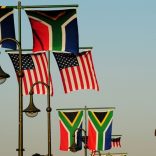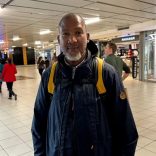South Africa, US to resume trade talks as tariff deadline looms
South Africa boosts deportations amid jobs crisis, minister says

File photo: GCIS
South Africa is pushing to deport more undocumented migrants who compete with citizens for jobs in an economy with one of the highest unemployment rates globally, the minister overseeing the program said.
The nation “is a neglected part of the global migration story,” with the contestation between foreigners and locals for positions becoming “a real tinderbox,” Home Affairs Minister Leon Schreiber said in an interview on Bloomberg Television Friday. “We’ve deported 51,000 people in the last year — that’s more than France and Germany combined. If we had more resources, we’d be doing more of that.”
South Africa has the continent’s most industrialised economy and sees a constant influx of job seekers from neighbouring countries, including Zimbabwe and Mozambique. But with the unemployment rate running at 33.2%, tensions between locals and foreigners run high. About 8.4 million people are eligible to work yet don’t have jobs.
In 2008, about 60 people died and 50 000 were displaced in a wave of xenophobic violence, with foreigners blamed for everything from unemployment to poor government services.
There were similar riots in 2015 and again in 2019, when President Cyril Ramaphosa was forced to apologize to other African nations who were appalled by the treatment of their citizens. Local media recently reported on incidents of foreigners being chased away from health clinics by angry residents.
South Africa is managing the situation responsibly, said Schreiber, who is a member of the Democratic Alliance, the second-biggest member of the country’s 10-party governing coalition.
“We’re anchoring what we do in the rule of law to make sure that we also protect social cohesion, even as we enhance our enforcement operations,” he said.
A so-called government of national unity was formed in June last year, when the ruling African National Congress failed to secure a parliamentary majority in a national vote for the first time since apartheid ended in 1994. The ANC and DA have since clashed repeatedly over policy and appointments, raising doubts over whether the alliance will remain intact.
“We’re in a better space now than we were initially,” Schreiber said, adding that disputes “are quite normal in any society with a coalition government.”
The coalition succeeded in navigating a budget impasse and with a new fiscal cycle about to begin, Schreiber said he’s hopeful any differences can be resolved in a “less public and destructive way.”
“If we can succeed in that, I think that builds another layer of confidence that we actually are working pretty well together,” he said.












Leave a Reply
Be the First to Comment!
You must be logged in to post a comment.
You must be logged in to post a comment.